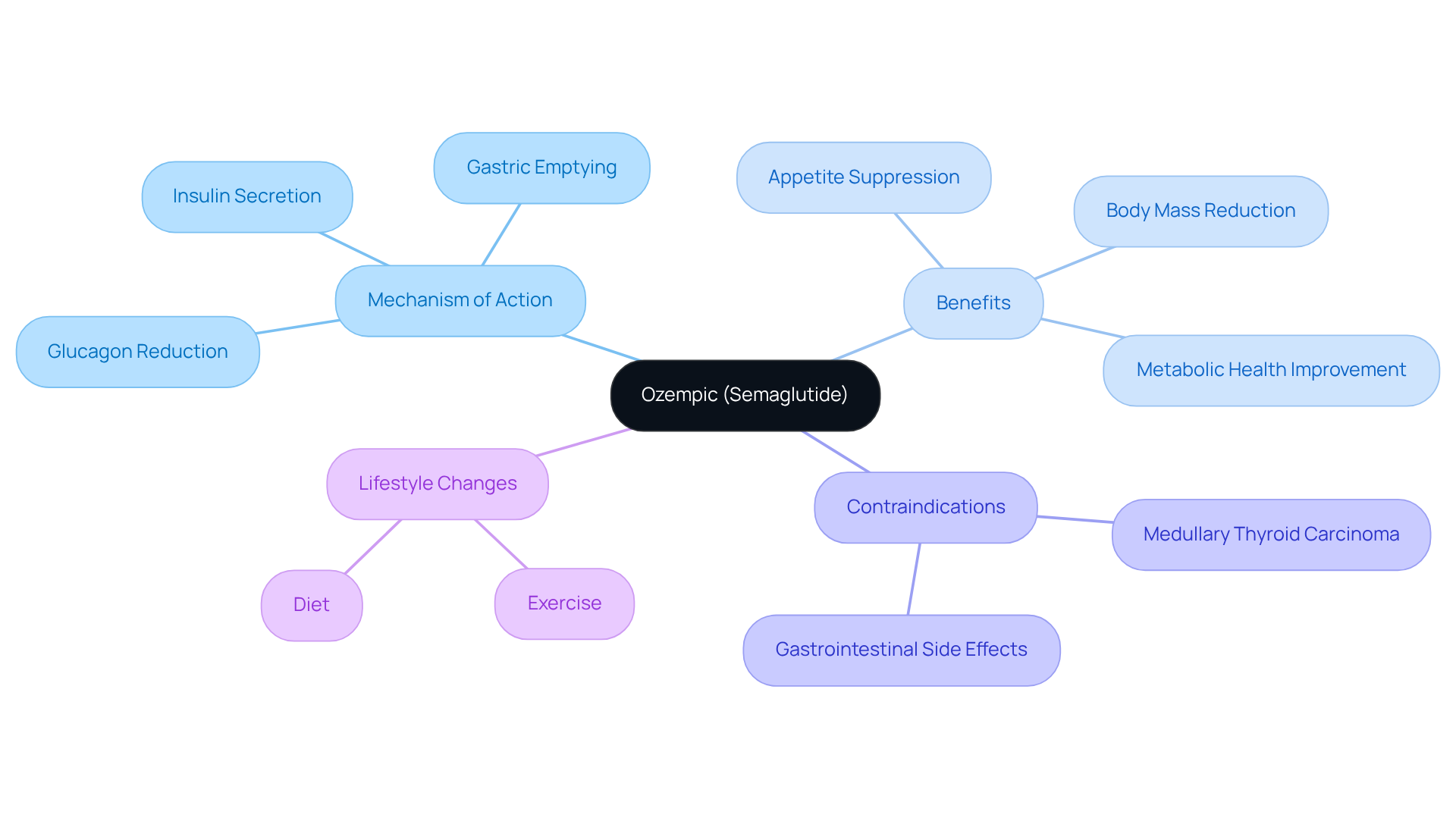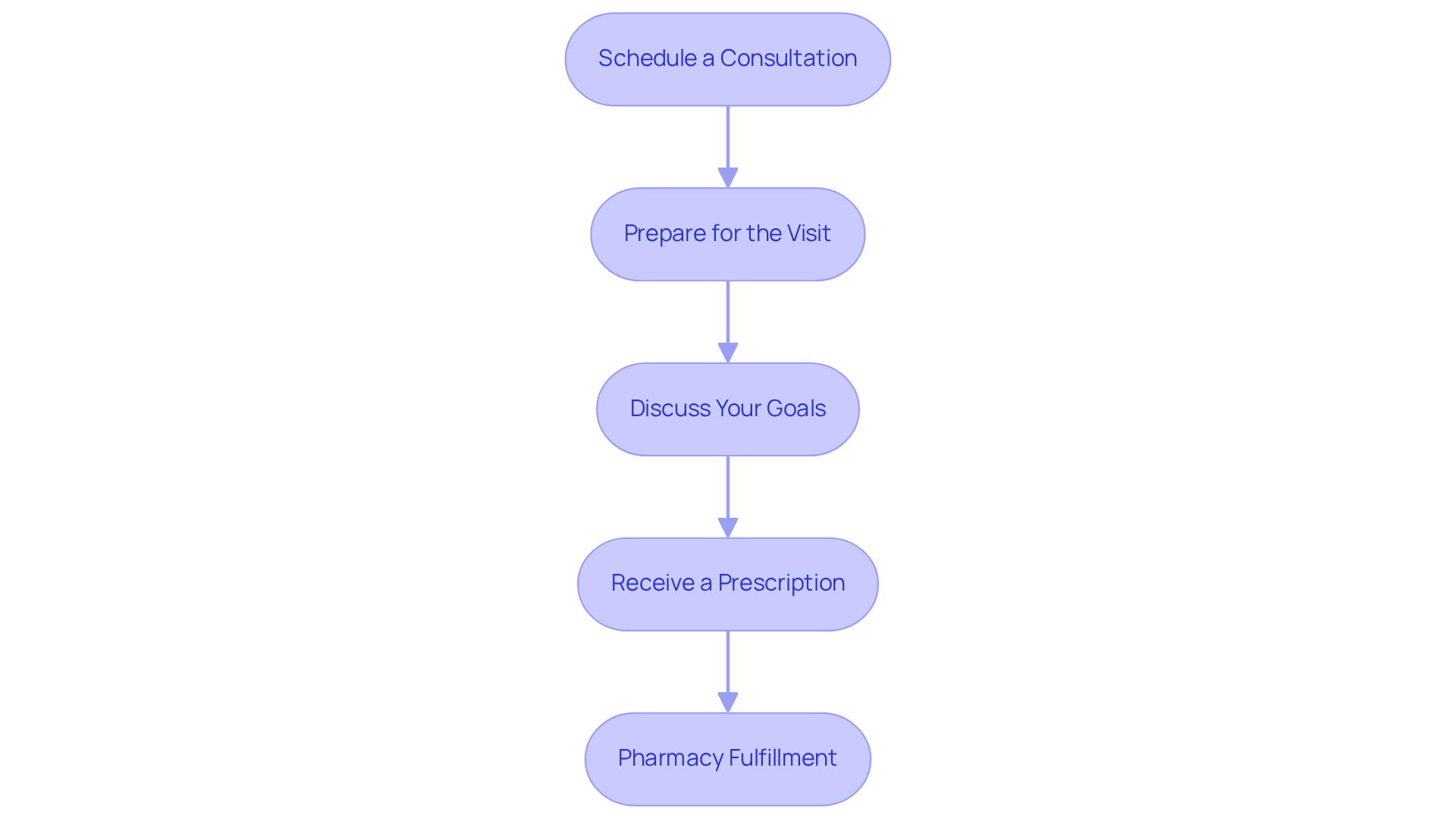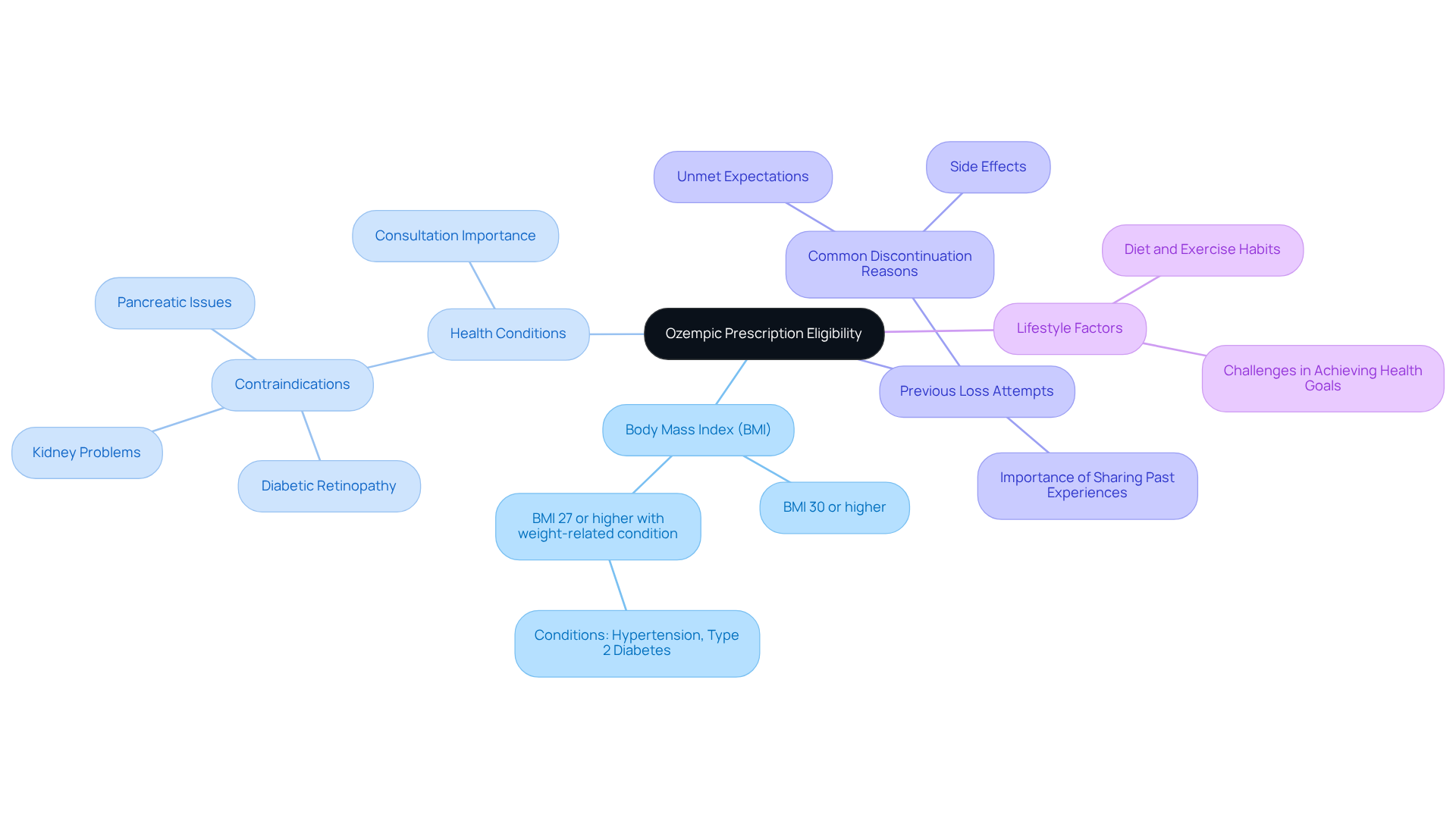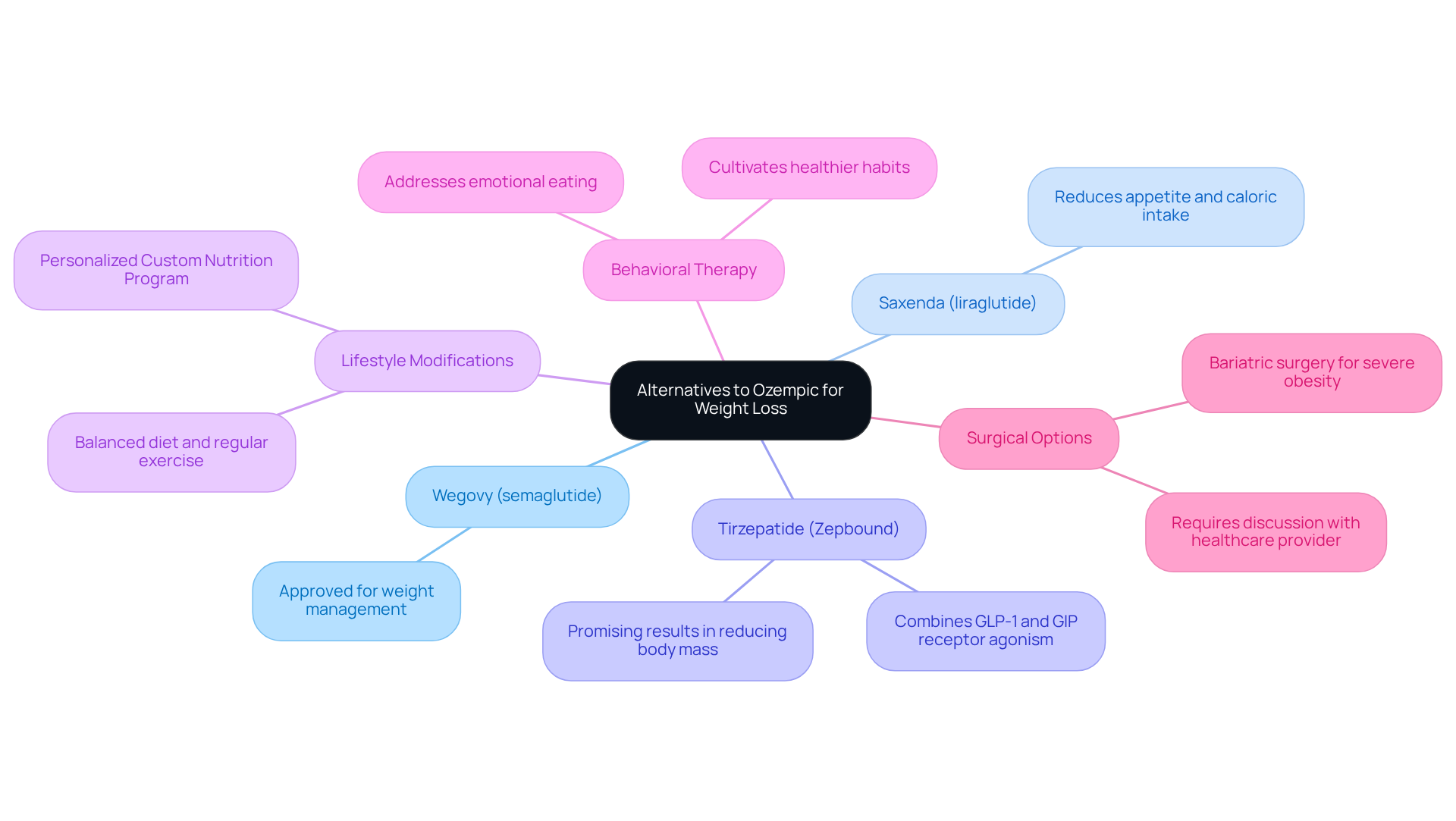Overview
If you’re considering Ozempic for weight loss, it’s important to know that the journey begins with a consultation with a healthcare provider. This step is crucial as it helps assess your eligibility based on your medical history, weight loss goals, and any existing health conditions. If deemed appropriate, a prescription can follow, guiding you toward your weight management goals.
We understand that navigating weight loss can be challenging, and that’s why this article outlines a clear, step-by-step process. It emphasizes the importance of personalized care and lifestyle changes alongside medication. You’re not alone in this journey; many individuals find that combining medication with supportive lifestyle adjustments leads to effective weight management.
In addition, remember that this process is about more than just a prescription. It’s about creating a holistic approach to your health. By focusing on both medication and lifestyle changes, you can achieve lasting results. We encourage you to take this step with confidence, knowing that support is available every step of the way.
Introduction
Ozempic has emerged as a groundbreaking option in the realm of weight loss, offering a unique mechanism that mimics a natural hormone to help individuals manage their appetite and improve metabolic health. We understand that many people are seeking effective solutions to combat obesity, and knowing how to obtain an Ozempic prescription is crucial in this journey.
However, this path isn’t without its challenges. Who qualifies for this medication? What alternatives exist for those who may not be eligible? These are important questions, and you’re not alone in seeking answers. This article delves into the essential processes and considerations surrounding Ozempic, guiding you toward informed decisions in your weight loss journey. Remember, support is available, and understanding your options is the first step toward achieving your goals.
Understand Ozempic: Mechanism and Benefits
Ozempic, or semaglutide, is a medication that mimics the action of a hormone called glucagon-like peptide-1, which your body naturally produces. This medication works by enhancing insulin secretion, reducing glucagon release, and slowing down gastric emptying. Together, these actions help lower blood sugar levels and increase feelings of fullness. At CT Medical Solutions & Beyond, we truly understand the importance of GLP-1 in our personalized medical programs, designed to support sustainable body mass management.
Many users find remarkable benefits from this medication, often experiencing appetite suppression that leads to a significant decrease in caloric intake. Clinical studies show that individuals using Ozempic can achieve a reduction of about 15-20% of their body mass over time. Additionally, it has been shown to improve various metabolic health indicators, making it a viable option for those struggling with obesity or weight management.
However, it’s essential to be aware that semaglutide is not suitable for everyone. It’s contraindicated for patients with a personal or family history of medullary thyroid carcinoma, and some users may experience gastrointestinal side effects like nausea and vomiting. As part of our comprehensive 16-week weight loss program, Dr. Jeneby emphasizes, “It’s crucial to use this medication alongside lifestyle changes, including diet and exercise.”
To find out how to get ozempic for weight loss, patients will need to go through an evaluation process that includes a thorough review of their medical history and a discussion about their weight loss goals. Understanding how this medication works and its effectiveness can highlight its role as a valuable tool in your journey toward lasting change and a healthier lifestyle. You’re not alone in this journey; we’re here to support you every step of the way.

Follow Steps to Obtain an Ozempic Prescription
If you’re considering an Ozempic prescription, here’s a compassionate guide to help you through the process:
-
Schedule a Consultation: Start by booking an appointment with a healthcare provider, whether in-person or via telehealth. It’s important to choose someone who understands body composition and GLP-1 therapies, as their expertise will be vital in your treatment journey.
-
Prepare for the Visit: Gather your medical history, including any previous weight loss attempts, current medications, and health issues that might affect your eligibility for treatment. This preparation can lead to a more fruitful discussion, ensuring your concerns are addressed.
-
Discuss Your Goals: During your consultation, feel free to share your weight loss goals and any worries you might have. Your provider will assess your eligibility for how to get Ozempic for weight loss based on your health profile, including your Body Mass Index (BMI) and any weight-related health issues. Remember, you’re not alone in this journey.
-
Receive a prescription: If it’s appropriate for you, your provider will write a prescription explaining how to get Ozempic for weight loss. They’ll also guide you on dosage and administration, making sure you understand how to use the treatment effectively.
-
Pharmacy Fulfillment: Once you have your prescription, take it to a pharmacy or consider using an online pharmacy service. Check if your insurance covers the medication, or explore patient assistance programs to help with costs. Many patients find that discussing coverage options with their healthcare provider can lead to valuable insights on managing expenses.
We understand that navigating this process can feel overwhelming, but with the right support and guidance, you can take meaningful steps toward your health goals.

Determine Eligibility for Ozempic Prescription
To determine your eligibility for an Ozempic prescription, let’s explore some important criteria together:
-
Body Mass Index (BMI): Typically, a BMI of 30 or higher is needed, or a BMI of 27 or higher if you have at least one weight-related health condition, like hypertension or type 2 diabetes. It’s worth noting that around 43% of U.S. adults with type 2 diabetes report using GLP-1 medications such as Ozempic. This medication is FDA-approved for managing Type 2 diabetes and is known for helping reduce body mass by enhancing insulin secretion and curbing appetite.
-
Health Conditions: It’s essential to have an open conversation with your healthcare provider about any existing health issues, as some conditions may affect your eligibility. For example, if you have diabetic retinopathy or certain kidney problems, semaglutide might not be the best option for you. Understanding these health factors is crucial for creating a treatment plan that truly fits your needs.
-
Previous Loss Attempts: Sharing your past experiences with weight loss can be incredibly helpful during your consultation. Research indicates that many individuals who try GLP-1 treatments stop within a year, often due to unmet expectations or side effects. This highlights the importance of a comprehensive approach to managing body mass, which includes personalized medication adjustments and support.
-
Lifestyle Factors: Be prepared to discuss your diet, exercise habits, and any challenges you face in achieving a healthier body. These elements play a vital role in shaping your personalized treatment plan. Importantly, this medication has been shown to help individuals lose an average of 12-15% of their body mass, making it a significant option for those struggling with obesity. At CT Medical Nutrition & Beyond, we emphasize the importance of tailored diet plans and organized support to ensure lasting results.
Understanding these criteria can help simplify the process of learning how to get ozempic for weight loss and ensure you receive the most suitable care tailored to your unique needs. Remember, you’re not alone in this journey, and we’re here to support you every step of the way.

Explore Alternatives to Ozempic for Weight Loss
If Ozempic isn’t the right fit for you, don’t worry—there are several alternatives to consider for your weight loss journey:
- Wegovy (semaglutide): Much like Ozempic, Wegovy is specifically approved for weight management and could be a great option for you.
- Saxenda (liraglutide): This GLP-1 receptor agonist helps with weight loss by reducing appetite and caloric intake, making it easier to reach your goals.
- Tirzepatide (Zepbound): A newer medication that combines GLP-1 and GIP receptor agonism, showing promising results in reducing body mass.
- Lifestyle Modifications: Embracing a balanced diet and regular exercise can significantly impact your body composition. At CT Medical Weight Loss & Beyond, our Personalized Custom Nutrition Program is tailored to your unique body, goals, and lifestyle. We’re here to provide the support you need to make real, lasting changes. Consider collaborating with our certified nutritionists to create a personalized plan that keeps you motivated and on track.
- Behavioral Therapy: Engaging in behavioral therapy can be a powerful tool to address emotional eating and cultivate healthier habits.
- Surgical Options: For those facing severe obesity, bariatric surgery might be a viable option after discussing it with a healthcare provider.
By exploring these alternatives and leveraging the support of CT Medical Weight Loss & Beyond, you can learn how to get ozempic for weight loss while taking meaningful steps toward a healthier lifestyle and achieving your weight loss goals. Remember, you’re not alone in this journey, and we’re here to help every step of the way.

Conclusion
Ozempic offers a hopeful path for those looking to shed pounds, tapping into a unique mechanism that mimics a natural hormone to boost insulin secretion and curb appetite. While it may not be the right fit for everyone, this medication can play a significant role in achieving lasting weight management when paired with lifestyle changes. It’s essential to understand both the benefits and limitations of Ozempic if you’re considering this treatment.
Getting an Ozempic prescription involves a few important steps:
- Scheduling a consultation
- Preparing your medical history
- Discussing your weight loss goals
- Receiving a prescription
- Filling it at a pharmacy
It’s also crucial to evaluate your eligibility based on factors like Body Mass Index (BMI) and any existing health conditions. This ensures that the treatment aligns with your unique health profile. If Ozempic isn’t an option for you, exploring alternatives like Wegovy, Saxenda, or even lifestyle modifications can open up other viable paths.
Ultimately, starting your weight loss journey with the guidance of healthcare professionals can empower you to make informed decisions and reach your health goals. Whether you choose Ozempic or other methods, committing to a healthier lifestyle is key. Remember, taking that first step isn’t just about losing weight; it’s about embracing a holistic approach to your well-being. You’re not alone in this journey, and with the right support, you can achieve the transformation you desire.
Frequently Asked Questions
What is Ozempic and how does it work?
Ozempic, or semaglutide, is a medication that mimics the action of the hormone glucagon-like peptide-1. It enhances insulin secretion, reduces glucagon release, and slows gastric emptying, which helps lower blood sugar levels and increases feelings of fullness.
What are the benefits of using Ozempic?
Users of Ozempic often experience appetite suppression, leading to a significant decrease in caloric intake. Clinical studies indicate that individuals can achieve a body mass reduction of about 15-20% over time, along with improvements in various metabolic health indicators.
Who should not use Ozempic?
Ozempic is contraindicated for patients with a personal or family history of medullary thyroid carcinoma. Additionally, some users may experience gastrointestinal side effects such as nausea and vomiting.
How is Ozempic used in weight loss programs?
Ozempic is used as part of a comprehensive weight loss program, alongside lifestyle changes including diet and exercise, to support sustainable body mass management.
How can patients obtain Ozempic for weight loss?
Patients interested in obtaining Ozempic must go through an evaluation process that includes a thorough review of their medical history and a discussion about their weight loss goals.
What role does Ozempic play in weight management?
Ozempic serves as a valuable tool in weight management by aiding in appetite suppression and promoting significant weight loss, contributing to a healthier lifestyle.




